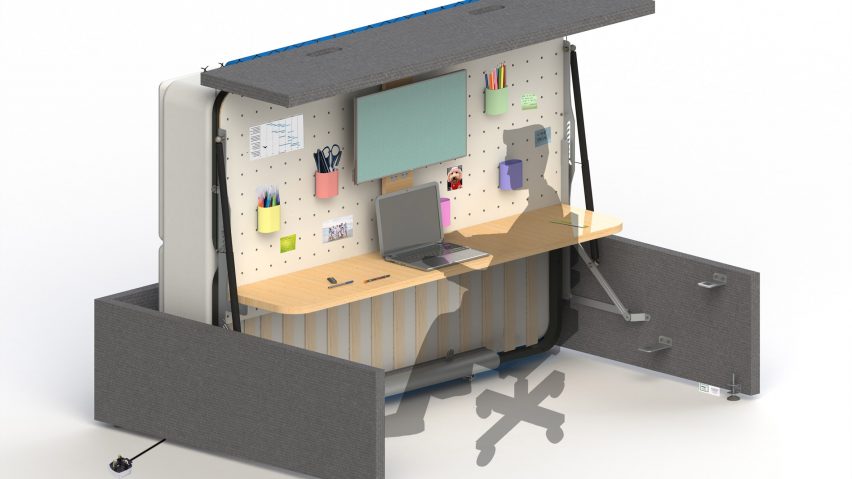
University of Leeds spotlights 11 product design projects
Dezeen School Shows: a nebuliser offering a more flexible approach to cystic fibrosis care and a solution to throw-away plastic toothpaste tubes are included in Dezeen's latest school show by students at the University of Leeds.
Also included is a tool that engages the senses to help those suffering from anxiety and a collapsible solar heater created to provide drinking water at high altitudes.
University of Leeds
School: University of Leeds School of Mechanical Engineering
Course: BSc Product Design
Tutors: Dan Trowsdale, Dr Raymond Holt, Dr Briony Thomas, Rafeeq Chaudhry, Dr Lisa-Dionne Morris, Dr Hau Hing Chau and Dr Omar Huerta
School Statement:
"Our multidisciplinary course bridges the gap between arts and engineering as it touches every aspect of modern life.
"We offer an even balance of art and technology, allowing our students enough freedom to explore the links between the two.
"Our design students gain the broad base of skills to work with designers from both arts and engineering backgrounds to see a product development process through from initial concept to design and production.
"Our course is part of a University with an international reputation for design and innovation across many disciplines.
"All of our staff are experienced product designers or active researchers in related fields, which means that cutting-edge learning and teaching, and our strong links with the industry, give our students the perfect environment to innovate and learn."
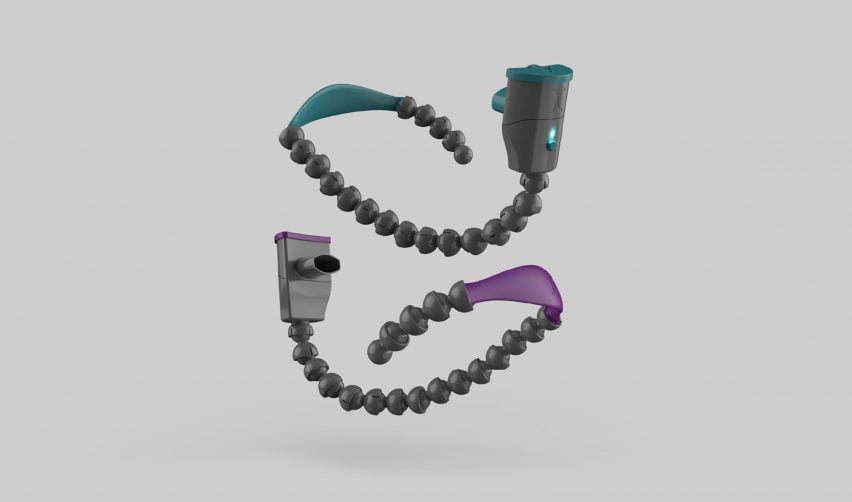
Flex Nebuliser by Emma Reece
"Cystic fibrosis (CF) is a progressive, genetic condition that causes mucus to build up in the lungs and digestive system, causing respiratory distress, lung infections and digestive problems. Consequently, people living with CF use nebuliser treatments to inhale different medications.
"However, traditional nebuliser treatments are often regarded as a burden as they limit daily activities. Problems include the design's bulky nature, excessive tubing and the need to be handheld to the mouth. This leads to excessive fatigue, frustration and missed treatments.
"The Flex Nebuliser is a wearable device that allows for hands-free nebulisation on the go. It is a portable, lightweight and adjustable alternative to current inconvenient nebulisers.
"With a wearable nebuliser, medication can be inhaled whilst cooking, working on a laptop, feeding a baby and much more. The Flex Nebuliser is designed to fit in and around the daily routine rather than disrupting it, to reduce high rates of non-adherence."
Student: Emma Reece
Course: BSc Product Design
Tutor: Dr Raymond Holt
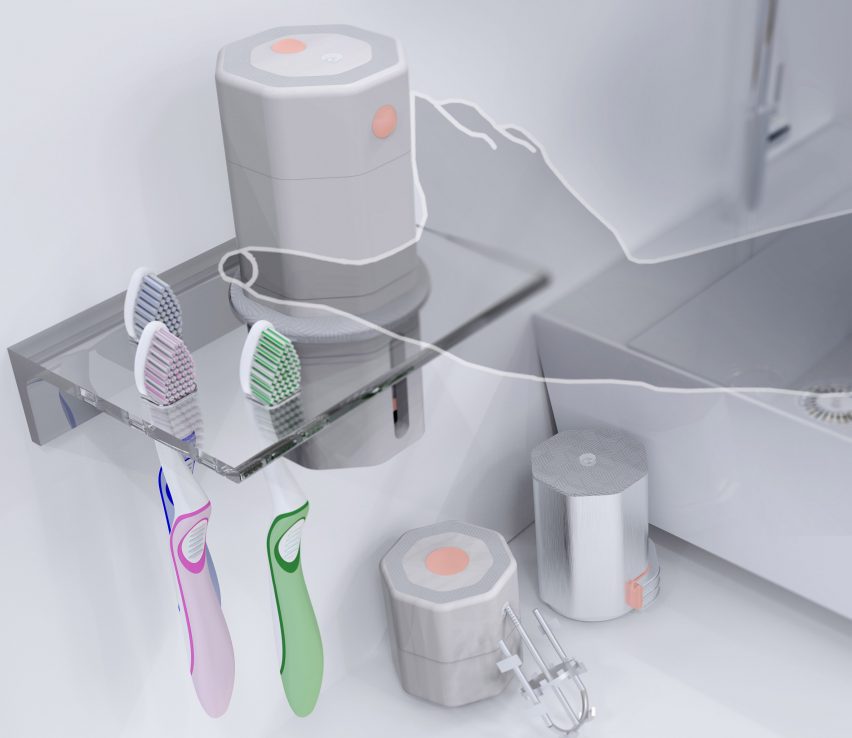
EcoTeeth by Ella Palethorpe
"300 million toothpaste tubes go to landfill every year. Toothpaste tubes are made from a number of materials that keeps the paste fresh for safe storage, but it also makes them almost impossible to recycle.
"Surveys have shown that sustainable toothpaste alternatives are unpopular because they are not in a paste form. EcoTeeth enables users to mix and dispense toothpaste at home by simply pressing a button.
"The portioned ingredients are delivered in reusable and recyclable packaging (Reusapack) via a monthly subscription. The ingredients are packaged as a powder and liquid to avoid any safety issues and provide a fresher toothpaste, with no preservatives.
"The user's Make-a-Paste machine mixes these ingredients to create a month's worth of toothpaste, which is automatically dispensed for each brush. Ecoteeth collects the empty Reusapacks to be cleaned, refilled, and redistributed for the following month's toothpaste."
Student: Ella Palethorpe
Course: BSc Product Design
Tutor: Dan Trowsdale
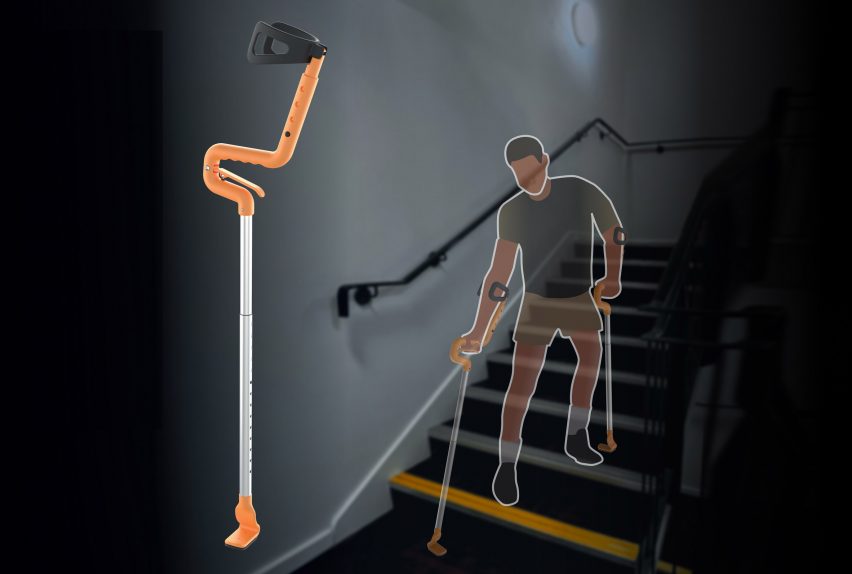
Stair Aid by Tianchen Tao
"Regular crutches fail to provide adequate walking assistance for users with sprained ankles on the stairs. The instability regular crutches give can lead to misuse, including increasing the risk of falling and developing long-term ankle issues.
"Stair Aid explores alternative walking gaits based on the methodology of traditional crutches, to provide quick and safe stair manoeuvrability. This is achieved via a quick length adjustment technique, supporting a new gait proposed specifically for stair climbing.
"With glass-filled polyamide and aluminium, Stair Aid is designed to be both durable and recyclable. The internally mounted locking mechanism ensures a consistent aesthetic. The curved endpoint allows a wider tilting angle, enhancing user comfortability and safety.
"With a pair of Stair Aid crutches, users can walk quickly on both flat surfaces and stairs. Its unique design enables safe and comfortable use, removing the need for awkward one-legged height adjustments."
Student: Tianchen Tao
Course: BSc Product Design
Tutor: Dr Raymond Holt
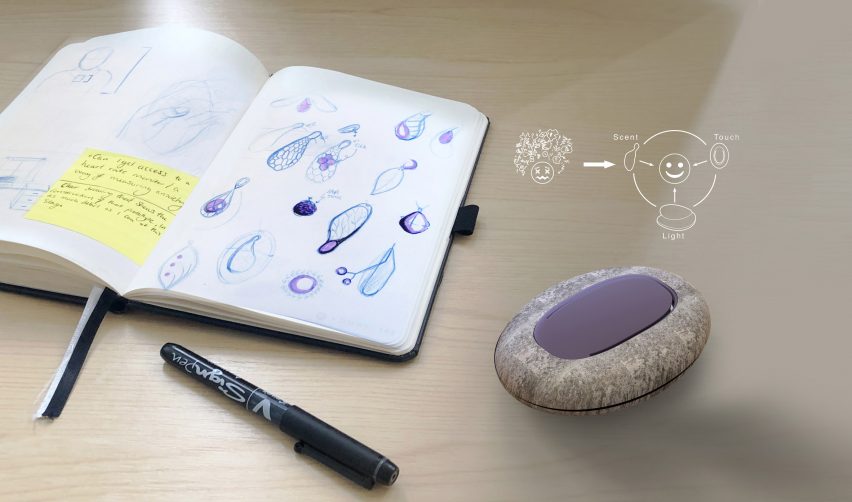
Moment by Suzannah Dearden
"Covid-19 has brought new challenges to the forefront for those suffering from anxiety, especially students with busy lifestyles.
"Moment engages tactile, visual and olfactory senses known to keep people present when they feel overwhelmed, redirecting users' natural 'fight-or-flight' instinct back to physical sensations.
"The holistic experience helps ground their mind back to the present moment, drawing on our primitive need for the comfort of touch. This is achieved via three naturalistic elements.
"The Scent Seed soothes the user by diffusing calming aromas throughout the day. The Pocket Pebble mimics heartbeat frequencies to slow the users heart rate and act as a counter for cardiac coherence exercise. The Zen Stones utilise colour theory, emitting ambient light to create a relaxing environment.
"The modular elements of Moment allow the product to be personalised for separate or combined use."
Student: Suzannah Dearden
Course: BSc Product Design
Tutor: Dr Briony Thomas
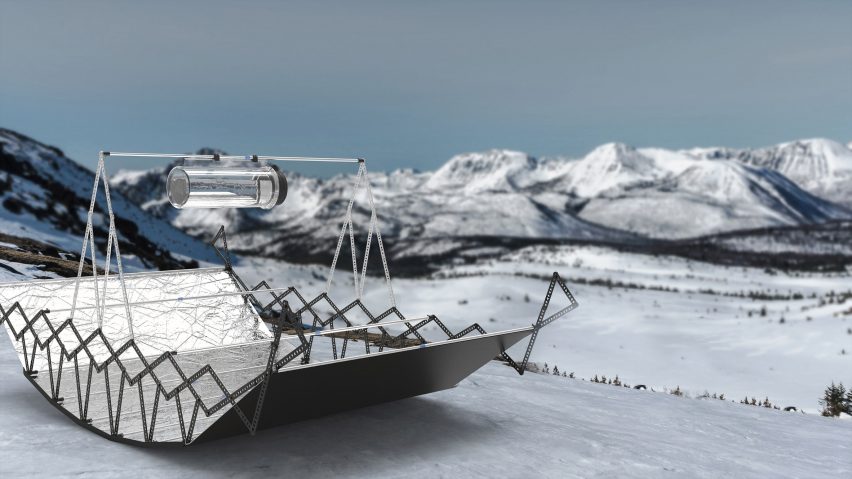
Summit by Lucas Fordham
"Summit is a collapsible solar heater designed to provide drinking water for mountaineers at high altitudes. It uses renewable solar energy to remove the need for unsustainable traditional fuels.
"The device's sole purpose is to ensure mountaineers stay hydrated, whilst reducing the amount of liquid fuel they carry.
"The innovative reflective fabric in the device uses parabolic technology to collect solar energy, which is transferred to melt the glacial ice.
"Summit is designed to contain the melted water, for the user to later purify via traditional methods, requiring significantly less liquid fuel than traditional ice melting methods."
Student: Lucas Fordham
Course: BSc Product Design
Tutor: Dr Hau Hing Chau
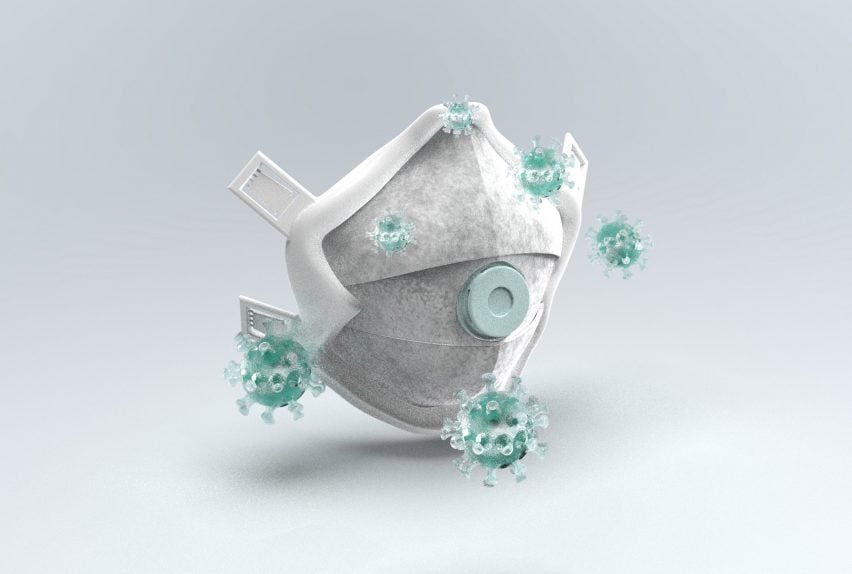
Inclusive PPE by Abigail Simpson
"Anthropometric data for PPE is based on the average European male, causing many women to fail 'fit tests' needed for masks. This accounts for 9 per cent of healthcare workers who fail fit tests, leading to an unjust increase in the risk of infection.
"The solution is a mask adapter which sits on top of the original mask being pulled taut by straps to form a secure seal, protecting the user from microorganisms. The adapter uses 3D scans to obtain CAD data for each user's face.
"An automated CAD process models the adapter flush to each user's face. Each unique model is 3D printed to produce the geometrically complex parts in a way that is suitable for functional medical products.
"By tailoring each adapter, money is saved by utilising existing masks and only producing the product for those who fail fitness tests."
Student: Abigail Simpson
Course: BSc Product Design
Tutor: Dr Raymond Holt
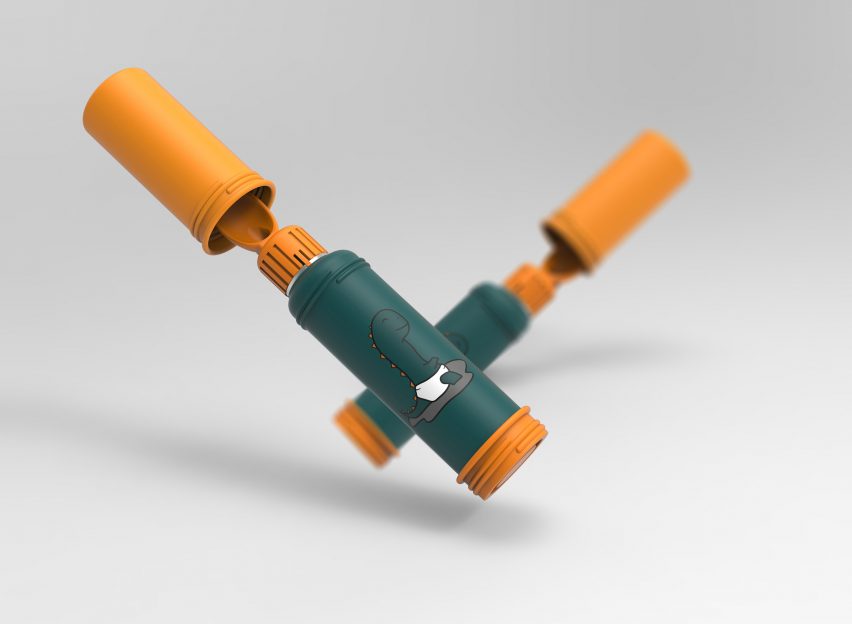
Dino Spoon by Tom van der Linden
"Dino Spoon is a sustainable alternative to traditional baby-food pouches. The product includes a refillable container that dispenses food directly onto a spoon.
"Made from infinitely recyclable materials, stainless steel and built to last, parents can pass the Dino Spoon onto friends and family once their child has grown.
"The product maintains the convenience of baby food pouches by being mess-free, easy to clean and portable."
Student: Tom van der Linden
Course: BSc Product Design
Tutor: Dr Raymond Holt
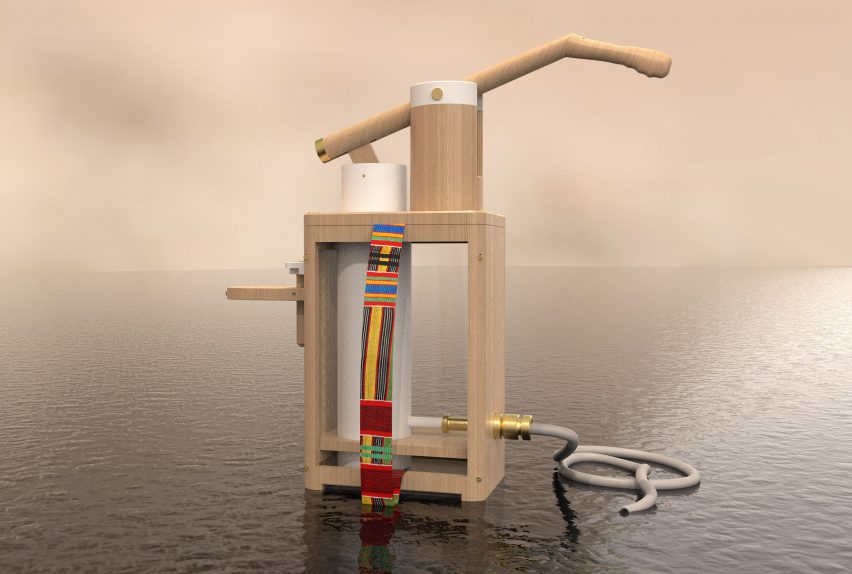
Artisanal Blue by Renée Anagbo
"Currently, fishermen on the shores of West Africa face the continuous and back-breaking task of keeping water from filling up in their handmade canoes.
"Artisanal Blue is a manual water pump that provides a sustainable alternative to expensive hand pumps, and labour-intensive, manual bucket bailing. It is designed for the local carpenter to make out of readily available, familiar materials. With community job creation in mind, manufacturing processes have been kept simple and accessible.
"The Artisanal Blue features a quick 'slot and go' clamp system, appropriate as strong, but temporary fastening to the canoe geometry. The pump's core valve mechanism has been designed using cheaper materials to drive down the product's cost significantly.
"Through user-centred design processes, an understanding of the fisherman's unique operating position resulted in the best solution for many fishing trips ahead."
Student: Renée Anagbo
Course: BSc Product Design
Tutor: Dr Hau Hing Chau
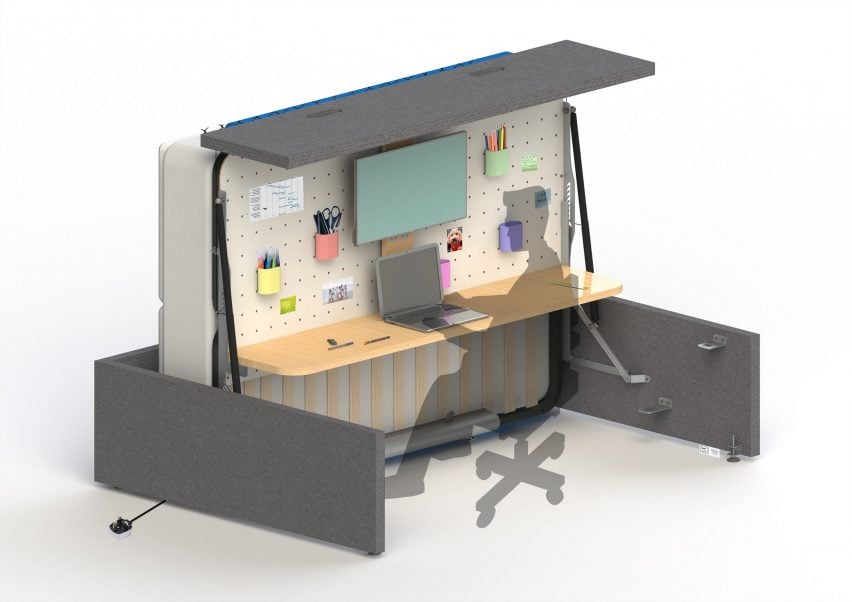
Flexible Furniture for Hybrid Working by Samuel Feroleto
"Following the pandemic, hybrid working has become the norm. Whilst most are embracing this change, it has highlighted inequalities among the workforce, with Generation Z being worst affected.
"The problem stems from the fact that Gen Z is forced to work remotely from their bedroom, often within shared accommodation. This is often not suitable as it blends work, leisure and recreational activities into the same physical environment.
"Flexible bedroom furniture enables Gen Z workers to transform their small spaces, from a bedroom to a workspace and vice-versa. The design uses a pair of four-bar linkages to enable the furniture's transition between its horizontal (leisure) and vertical (work) states, seamlessly setting boundaries and reclaiming space.
"The desk's ability to remain horizontal across both states allows users to leave their workspace and conveniently pick up where they left off. This convenience is considered across the whole design as the workstation is ergonomically designed to be customised for users' preference."
Student: Samuel Feroleto
Course: BSc Product Design
Tutor: Dr Raymond Holt
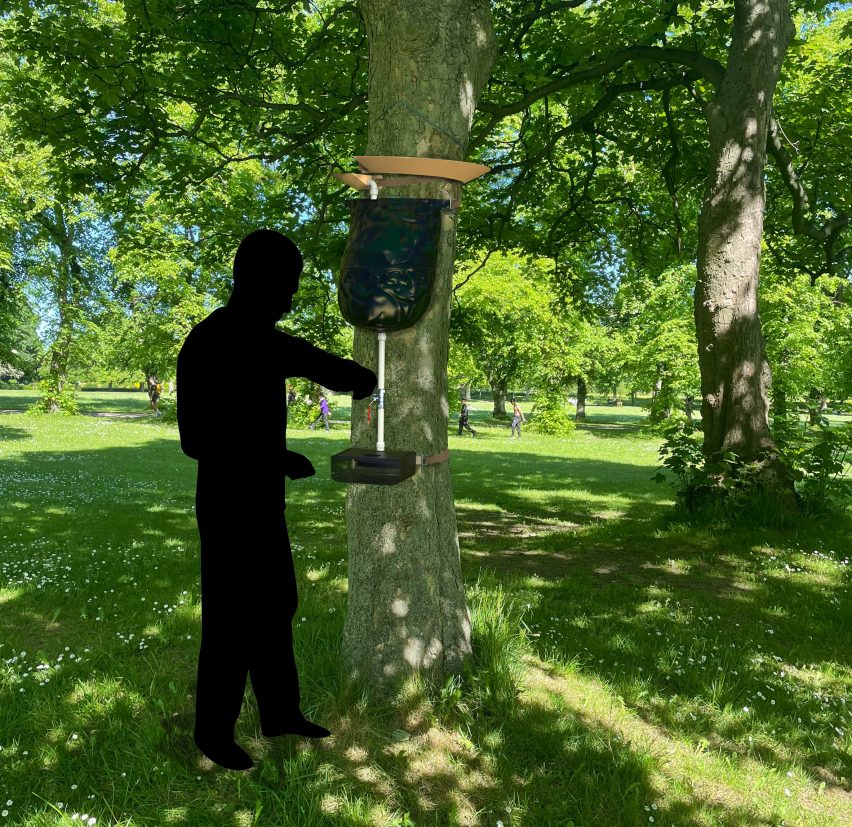
Green-Wash by Edward P. Davies
"The 'Green-wash' eases facilitation and increases effectiveness of handwashing in outdoor environments away from running water.
"It collects and stores water from trees and reduces the amount of water needed per hand-wash in communal and private venues such as forest schools, parks, allotments and more.
"Water that gathers towards the trunk of the tree is collected into the flexible rubber gutter and into a storage bag where a valve directs it towards the hand sprayer.
"The sprayer is actuated with a valve and reduces water usage by dispensing water over the whole area of the hand at once. Installation is effective on various diameters of trees and at any height to be accessible for different users. Intended to be as simple, intuitive, and flexible as the outdoor environment in which it is found and used."
Student: Edward P. Davies
Course: BSc Product Design
Tutor: Dan Trowsdale
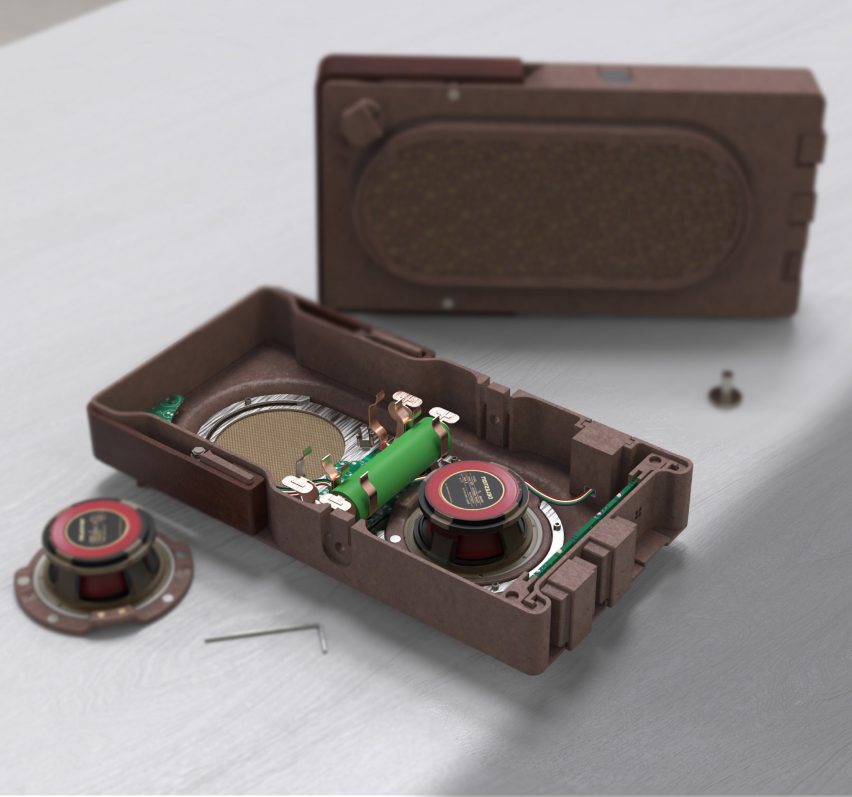
Right to Repair Speaker by William Greatorex Hare
"Currently, repairing audio products is challenging for the everyday user. Non-intuitive fixings, difficulties in sourcing specialist parts and perceived difficulty with repairing electronic goods (for the everyday consumer), make e-waste the fastest growing global waste stream.
"The Right to Repair Speaker is designed to simplify the act of repairing, upgrading and recycling components for both users and waste operatives.
"Repair: here the entire product is disassembled by hand or using a standard hex key. This makes subassembly modules easily accessed and replaced.
"Upgrade: the 'upgrade modules' enable users to add functional features, for example, adding airplay, radio or generative ambience. While also tackling obsolescence, personalised experiences aim to achieve greater user attachment to the speaker – lengthening the product's lifespan.
"Recycle / Recirculate: the housing and handle are made from biodegradable recirculated waste materials. The intuitive disassembly streamlines the recycling process. Through a remanufacturing business model, parts stay in their useful life cycle for longer."
Student: William Greatorex Hare
Course: BSc Product Design
Tutor: Dan Trowsdale
Partnership content
This school show is a partnership between Dezeen and University of Leeds School of Mechanical Engineering. Find out more about Dezeen partnership content here.